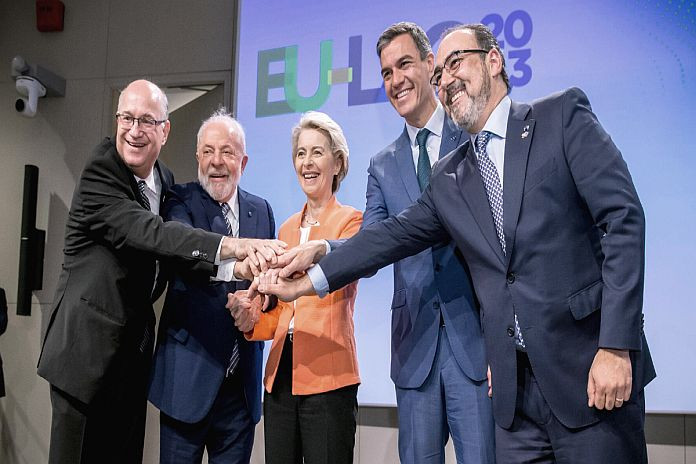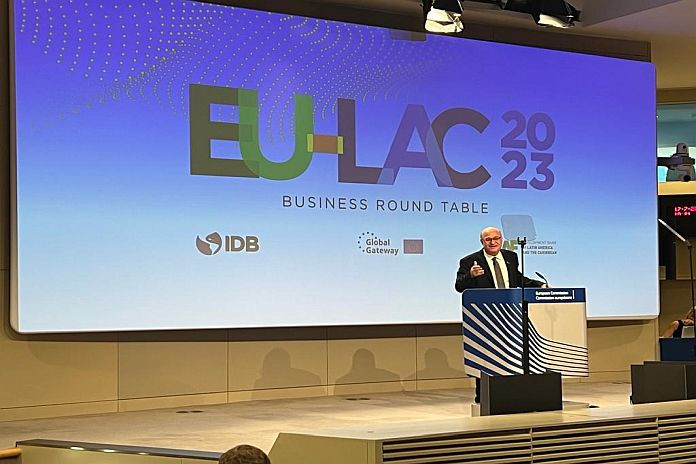BRUSSELS, Belgium – The European Union’s new investment strategy can strengthen the role of Latin America and the Caribbean (LAC) as a key part of the solution to regional and global challenges, including climate change, biodiversity and food insecurity, IDB president Ilan Goldfajn said at a historic summit between the two regions, which brought together governments from the European Union and the Community of Latin America and Caribbean States for the first time in eight years.
The “New Agenda to strengthen the EU’s partnership with Latin America and the Caribbean” lays out Europe’s goals for reinvigorating political and economic ties. The Agenda includes boosting investment though the EU’s Global Gateway program to narrow the existing gaps.
“Latin America is now perfectly positioned to be part of the solution to the world’s biggest challenges, including climate change, food insecurity and biodiversity protection. By working closer together, the public and private sectors of Europe and of our region can make this opportunity a reality,” president Goldfajn said.
Latin America is key to the clean energy transition. Thirty percent of LAC’s total energy supply is from renewable sources – double the world average – and if properly harnessed, this number could grow exponentially. It is home to two-thirds of the world’s lithium and 38 percent of its copper, both of which are critical to producing clean energy and electric vehicles, including those manufactured by European automakers. The region is also the world’s top net-exporter of food, but could produce eight times more with the right reforms and investment, alleviating food insecurity.
In addition, the region is home to 40 percent of the world’s biodiversity. The Amazon alone absorbs a quarter of the world’s carbon emissions, so protecting it is key to achieving global climate goals. For this reason, the IDB is launching the holistic umbrella program Amazonia Forever.
Europe’s new agenda comes as foreign direct investment in Latin America and the Caribbean is rising. Last year, it hit a record $225 billion, according to a new report from the United Nations. Europe’s own direct investment in the region now surpasses its direct investment in India, China and Japan combined.
“This investment benefits not only Latin America and the Caribbean, but also the European Union, at a time of many shared priorities. The IDB has been the partner of choice of Europe and European companies to scale financing and maximize impact, including through our new and innovative financial tools,” said president Goldfajn.
To promote closer ties and investment in the region, the IDB co-organized a Business Round Table at the summit, attended by private- and public-sector leaders from both sides of the Atlantic, including European Commission president Ursula von der Leyen, Spanish president Pedro Sánchez, Brazilian president Luiz Inácio Lula da Silva and CAF executive president Sergio Díaz-Granados.

While in Brussels, the IDB delegation met with leaders from across Latin America and the Caribbean and Europe, including from key private-sector companies, such as Nokia and Siemens. President Goldfajn also met with heads of state from the region and with European Union High Representative for foreign affairs and security policy and vice president of the European Commission Josep Borrell, who has been promoting stronger, more strategic ties between the two regions. He also met with Jutta Urpilainen, the European Commissioner for International Partnerships.
Thirteen European Union countries have been members of the IDB for almost half a century. They have partnered with the bank on a vast array of projects, ranging from digitalization to climate adaptation and mitigation, gender equality, water and sanitation, infrastructure, community development and trade, all aimed at promoting sustainable development.
Over the past decade, the IDB and the EU have collaborated on regional policy dialogues, co-financed projects and implemented 49 joint initiatives.
The collaboration includes examples such as Spain’s contribution to a water and sanitation fund that has directly benefited over three million people. The IDB has also partnered with the French Development Agency to jointly finance $6.3 billion in social, climate, infrastructure and digitalization projects. And Germany helped the IDB launch the Green Bond Transparency Platform, which now covers well over three-fourths of the region’s green bond issuances.
Over the past year alone, the European Commission has allocated $35.5 million in grants for IDB projects, from health to trade. European countries are also key contributors to the IDB’s new Amazonia Forever program, which will protect this extraordinary natural space and facilitate investment in sustainable development.






